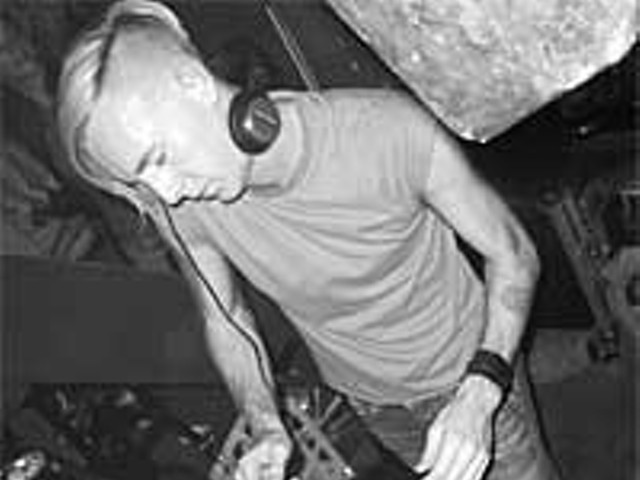The men begin parking along the quiet residential street in Redford around 9 on Saturday nights — and the last leave around 6 Sunday mornings. In the intervening hours, some 40 to 85 men pay $12 to engage in orgy-style sex in the basement and ground-floor rooms of the ranch-style home. There are few rules. "Don’t ask, don’t tell" is the typical approach to the question of HIV status. And condoms are rarely used.
That’s the point at a "bareback" party.
The practice is seen as one of the reasons for a resurgence in HIV infections among gay men. Last year, the Centers for Disease Control reported that among gay men, the number of new infections in 2002 was 17 percent higher than it had been in 1999.
Although hard data is scant, parties like the one in Redford are seen as a particularly troubling aspect of barebacking, which rejects the safe-sex campaigns that have been central to combating the spread of HIV since its emergence in the 1980s.
The parties, which began in the ’90s, are now "entrenched in gay culture," says Dr. Perry N. Halkitis, a New York-based expert on the spread and prevention of HIV in the gay community.
A professor of applied psychology at New York University, Halkitis noted in a 2001 paper for The Journal of Men’s Studies that for some gay men barebacking — which he defined as "intentional unprotected anal intercourse" — is "an affirmation of life."
The practice, he wrote then, was on the rise for gay men, especially those already infected with HIV, the virus that leads to AIDS. But, in addition to HIV-positive men, "such risky behaviors have been noted across all sectors of the gay community throughout the last several years."
For those who engage in the practice, Halkitis says during an interview with Metro Times, "It’s a big part of how they define themselves. And it’s not just positive guys anymore; it’s negative guys taking on this mentality too."
The party scene, he says, only magnifies the risks of uninfected men contracting infections, and the risks of already infected men to contract new strains of HIV. "If you’re going to a party and getting penetrated by 20 guys, the probability increases" for infection, Halkitis says. "That’s just a mathematical fact.
"I think the AIDS epidemic and trends travel fast because people travel. I imagine parties will proliferate in cities like Detroit."
From the evidence on Web sites and conversations with men who frequent parties in metro Detroit, the proliferation is already happening.
Several men who describe themselves as current or former regulars at bareback parties tell Metro Times that they can find a party like the one in Redford any night of the week in the Detroit area.
"Sexual adventurism"
In the clinical language of "An Exploration of Perceptions of Masculinity Among Gay Men Living with HIV," Halkitis explored the perceptions and feelings of 22 HIV-positive men recruited through the Internet:
"Sexual adventurism and frequent sexual contacts were suggested as mechanisms by which one could affirm masculinity and ultimately one’s desirability and virility, even while living with HIV infection. For some of the participants, the need for unprotected sex was a means of asserting their masculinity and also a mechanism by which they could achieve a social and emotional contact" with other HIV-positive men.
Those words parallel the account of Kurt, a 50-year-old Oakland County man, who asks that his last name not be used. In his 40s, he says, he ended a 16-year marriage after realizing he was gay. He contracted HIV during his first gay sexual encounter — after his partner for the night assured him there was no need for a condom. Feeling inadequate and dejected, he attended his first bareback party in 1997 at the Redford home at the urging of a friend. He found camaraderie and, for a time, became a regular at bareback parties throughout metro Detroit
"Humans have an innate need to be held and touched, and that’s what makes this so difficult," Kurt says. "I know that’s what my problem was. I was willing to risk my life just to have that intimate contact with someone, and I think that’s what it comes down to with a lot of people."
He would "never knowingly bareback a negative guy," he says. But since the norm was not to discuss HIV status, he may have. And even for HIV-positive men, unprotected sex runs the risk of reinfection with new strains of the virus.
Kevin, a 32-year-old Wayne County man who asks that his real name not be used, describes the excitement of the parties like the ones in Redford, which he has been attending for about a year. There’s uninhibited sex in the dingy rooms, some completely dark, some dimly lit. Booze and a variety of illegal drugs are consumed. (So-called club drugs, such as meth, ecstasy and GHB, are a major element to the bareback party scene, according to one of Halkitis’ studies.)
"You feel like you have a lot of people wanting to hook up with you," Kevin says. "It’s a lot of attention, and you like that. When you’re not used to attention, it just feels real good."
And those connections are stronger, he says, when there’s no condom involved.
At a recent party, he says, he had sex with eight men. Not knowing their HIV status added to the thrill. If anyone were to ask his, he wouldn’t be able to say. He hasn’t been tested recently.
Dangerous complacency
From the beginning of the AIDS epidemic in the early ’80s through the mid-’90s, the virus was a virtual death sentence. The development of anti-AIDS drug cocktails changed that. But, ironically, that’s made the fight against AIDS seem less pressing — which, in turn, has contributed to infection rates that are again rising.
And although the HIV infection is spreading in troubling ways among a number of groups — the rise for black heterosexual women, for instance, came up during the recent vice presidential debate — the majority of HIV-positive individuals continue to be gay and bisexual men. As of July, the Michigan Department of Community Health counted 10,940 cases of HIV infection in Wayne, Oakland and Macomb counties — up nearly 4 percent from a year earlier.
"We’ve kind of made it OK to have HIV," Kurt says. He is currently on a disability leave from his job because of the progress of his infection. "It’s almost like HIV has become another diabetes, a very livable disease. The urgency to do anything isn’t there anymore. There seems to be this whole complacency thing with unsafe sex."
And beyond complacency, there seems to be backlash against the safe sex campaigns that have been aimed at the gay community for years. The old campaigns seem to be "stuck in the 1980s," Halkitis says.
Meanwhile, Web sites and some porn movie companies champion barebacking. "Our guys fuck and suck without any barriers, lectures or bullshit," a blurb at bareback.com reads. The site, and others like it, helps barebackers connect with one another for one-on-one encounters, groups and parties.
Jeff Montgomery, executive director of the Triangle Foundation, a gay advocacy organization in Detroit, says that some men turn to barebacking parties to get away from the safe-sex message they get at bathhouses. "It was like going to school to get educated on sex," he says, describing the way some gay men perceive the bathhouses.
Still, Montgomery says, the only way to deal with barebacking is to educate gay men about safe sex and the dangers of unsafe sex.
Joe Kort, a Royal Oak-based psychotherapist and gay author, says he works with many men who frequent bareback parties. He sees the parties as "a very angry phenomenon" where men act out "internalized hatred."
"A big part of why men go is for a sense of belonging, because we don’t get that as gay men, especially growing up in a straight culture," Kort says. "But a lot of men who come to me don’t understand they are putting themselves and others at risk. They don’t take responsibility for what they are doing. We’ve become the bullies that bullied us as kids, and we don’t even see it."
Kort says that AIDS organizations should do more to deter gay men from barebacking — at parties and otherwise.
And Halkitis says research into the barebacking is urgently needed to head off a possible "second wave of the HIV epidemic."
Kurt says the party scene has changed over the past couple of years, attracting a "broader crowd" of both HIV-positive and HIV-negative men. He no longer goes to them, he says.
And he worries about those who do.
Anthony Martinez Beven is a former Metro Times intern. Send comments to [email protected]




